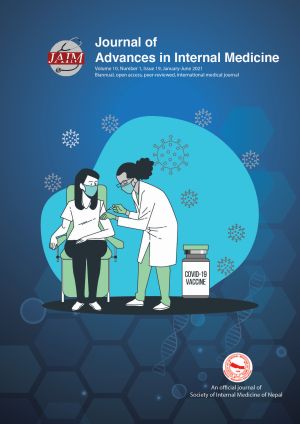COVID-19: Vaccine and antimicrobial resistance what are the global implications?
DOI:
https://doi.org/10.3126/jaim.v10i1.37099Keywords:
BNT162 vaccine, COVID-19 pandemic, COVID-19 vaccines, Drug Resistance, mRNA-1273 vaccine, P.1 SARS-CoV-2 variant, SARS-CoV-2 B.1.351 variantAbstract
Antimicrobial resistance is a worldwide and highly quantified risk to global health and is more prevalent than resistance developed in vaccines as both antimicrobial resistance and vaccine resistance develop in different settings and because of alternate mechanisms. Vaccines act as a preventative measure and allow the immune system to kill any pathogen in the initial phases when the load is relatively low. This circumvents the replication of the pathogen and thus prevents the formation of mutations and furthermore resistance which is attributed to those mutations. Mutations in the target and or binding sites of a said therapeutic regime confer resistance more often in antimicrobials than they do vaccines.
The alteration of a vaccines binding site does not confer resistance as a vaccine produces a wide spectrum of antibodies due to multiple epitopes on the said antigen, the remaining antibodies are thus still protective. In antimicrobials however, the drug targets a specific site and is not dynamic and thus if a mutation of the site arises, the drug efficacy is reduced.
Although vaccine resistance is less quantified it may also pose a substantial risk to Global health as currently evident with the COVID-19 pandemic. The current global pandemic caused by SARS-CoV-2 has developed a host of mutations which are displaying a degree of resistance and reduced efficacy to the vaccines. This reduced efficacy and resistance of the mutations to current vaccination programmes, poses a risk to global health. It is vital for new vaccines to be synthesized to specifically be active against the variants. It is likely that the synthesis and development of new vaccines to counter new variants as they arise will be an ongoing process. It is evident in future that new vaccines to the mutations in COVID-19 may have to be developed as they are for the seasonal influenzae virus.
Downloads
Downloads
Published
How to Cite
Issue
Section
License
This license enables reusers to distribute, remix, adapt, and build upon the material in any medium or format, so long as attribution is given to the creator.




